Text
A question to consider when you're writing fiction:
Can the story move forward without the main character making decisions and taking actions? If so, why are they the main character?
89 notes
·
View notes
Text
be proud of what you’ve written in the past, even if it wasn’t ur best work. u literally made a world, lives, people, out of nothing but a bunch of squiggles and ur imagination.
be happy with it <3
1K notes
·
View notes
Text
Writing Tips
Punctuating Dialogue
✧
➸ “This is a sentence.”
➸ “This is a sentence with a dialogue tag at the end,” she said.
➸ “This,” he said, “is a sentence split by a dialogue tag.”
➸ “This is a sentence,” she said. “This is a new sentence. New sentences are capitalized.”
➸ “This is a sentence followed by an action.” He stood. “They are separate sentences because he did not speak by standing.”
➸ She said, “Use a comma to introduce dialogue. The quote is capitalized when the dialogue tag is at the beginning.”
➸ “Use a comma when a dialogue tag follows a quote,” he said.
“Unless there is a question mark?” she asked.
“Or an exclamation point!” he answered. “The dialogue tag still remains uncapitalized because it’s not truly the end of the sentence.”
➸ “Periods and commas should be inside closing quotations.”
➸ “Hey!” she shouted, “Sometimes exclamation points are inside quotations.”
However, if it’s not dialogue exclamation points can also be “outside”!
➸ “Does this apply to question marks too?” he asked.
If it’s not dialogue, can question marks be “outside”? (Yes, they can.)
➸ “This applies to dashes too. Inside quotations dashes typically express—“
“Interruption” — but there are situations dashes may be outside.
➸ “You’ll notice that exclamation marks, question marks, and dashes do not have a comma after them. Ellipses don’t have a comma after them either…” she said.
➸ “My teacher said, ‘Use single quotation marks when quoting within dialogue.’”
➸ “Use paragraph breaks to indicate a new speaker,” he said.
“The readers will know it’s someone else speaking.”
➸ “If it’s the same speaker but different paragraph, keep the closing quotation off.
“This shows it’s the same character continuing to speak.”
77K notes
·
View notes
Text
show, don't tell:
anticipation
- bouncing legs
- darting eyes
- breathing deeply
- useless / mindless tasks
- eyes on the clock
- checking and re-checking
frustration
- grumbling
- heavy footsteps
- hot flush
- narrowed eyes
- pointing fingers
- pacing / stomping
sadness
- eyes filling up with tears
- blinking quickly
- hiccuped breaths
- face turned away
- red / burning cheeks
- short sentences with gulps
happiness
- smiling / cheeks hurting
- animated
- chest hurts from laughing
- rapid movements
- eye contact
- quick speaking
boredom
- complaining
- sighing
- grumbling
- pacing
- leg bouncing
- picking at nails
fear
- quick heartbeat
- shaking / clammy hands
- pinching self
- tuck away
- closing eyes
- clenched hands
disappointment
- no eye contact
- hard swallow
- clenched hands
- tears, occasionally
- mhm-hmm
tiredness
- spacing out
- eyes closing
- nodding head absently
- long sighs
- no eye contact
- grim smile
confidence
- prolonged eye contact
- appreciates instead of apologizing
- active listening
- shoulders back
- micro reactions
93K notes
·
View notes
Photo

Thorn collar, Thierry Mugler
65K notes
·
View notes
Text
Writers, please, please, please, I am begging you
I know we don't vibe with Mary Sues, and I know we like watching characters fail...
But if your character is the world's best assassin, they shouldn't be botching nearly every single step of every single job just because the plot demands it. If your character is one of the greatest fighters to ever live, they can't badly lose every single fight the plot throws at them and then barely win the final confrontation. If your character is a competent military strategist, they need at least a few small successes during the course of the plot. If your character is an experienced leader, they can't be constantly making the kind of missteps that realistically would cause their subordinates to lose confidence in them.
If your character is good at something. Show them being good at it.
15K notes
·
View notes
Text
Describing New Settings

Hey friends, Abby here with another writing post! Today I’m coming at you with tips on introducing new places through your character’s eyes — how to do it effectively and naturally, without overwhelming your reads with every little detail.
It’s often hard for readers to pick up on the exact appearance of a place upon the first visit, which is why this isn’t something you should aim for. Try to think of it through the filter of your own mind; if you walked into a museum you’ve never been to before, you wouldn’t expect yourself to remember every single detail, so you shouldn’t hold your readers to the same “standard”. So what would you remember?
What Draws the Eye?
Maybe they walk into someone’s bedroom and the walls are bright green. That would be pretty hard to forget, don’t you think? Most bedrooms don’t have bright green walls, so that’s something you’d probably notice and expect the next time you went into that room. Or maybe you notice how generic the room feels because there’s not much of a personal touch. These are all things you’d come to notice about a room when you enter it; we tend to look at everything holistically before picking out the smaller details. Keep that in mind when you’re writing your character’s very first impression. These could include (but are not limited to):
Stand-out wall colors
Lots of or very little “personal touch”
Clutter or lack thereof
Flow of the room (Does it seem to go well? Does everything seem to direct the character towards a certain view?)
Anything that would be drastically different from what the PoV character considers “normal”
That last one ties in especially when you’re picking out the smaller details. These are the things you might want to hold off on describing all at once, but introduce them slowly to give the reader more of a feel for the room. Details your character might include (but, again, are not limited to):
Any technology, like a computer on the desk
Minor similarities or differences between the new place and what the PoV character considers “normal”
Anything that might define the character who owns the place, if they’re in the story at all
Things that pop or sparkle or somehow draw the PoV character’s eye when they’re looking around
Things that pertain to the PoV character’s interests
Any collections (for example from my room, Taekwondo trophies and belts, or books)
Anything other characters in the room would draw attention to
What’s Important?
Are there things in this area that’ll be important later in the book? Take a second to notice these in your story, even if they just get a sentence. Establishing their existence in this place will help you nail the continuity that makes your life a whole lot easier when you’re seeing what went down earlier. Anything in this room can be important in one way or another, and I mean anything. For example, we’ll take two very different things:
A pencil and a pad of paper
A Swiss army knife
Your character might be needing one of both of these in the future. Maybe they’re writing down the time and place of their next dentist appointment. Or, ya know, maybe they’re fighting for their life against the savage vampire-werewolf-bigfoot hybrid that just broke into their house. Nothing out of the usual, right?
Either way, if your character needs these things at any point, it’s helpful to make the reader aware that they exist somewhere. If your character knows, do your best to convey that information to your readers. Unless you’re using it as a plot device, keeping your readers in the dark can be incredibly frustrating when the knowledge was something trivial.
So, that’s all I’ve got for you today! If there’s anything you want to see me write about in my next post, please don’t hesitate to leave a message in my ask. Until next time, much love! <333
3K notes
·
View notes
Text
Scheduling – Why it works for some writers
If you write, you already know that it’s not always easy. Being consistent and motivated is pretty hard sometimes.
What if I told you, scheduling might help keep you on track?
I’m wary of saying that everything will work for writers, because the truth is, we’re all different. The very mention of the word “deadline” could make one writer frazzled and another confident. But I figured, if an author who is writing for a publishing house has to meet deadlines and that’s how they get their books out, then why can’t I set my own to keep myself on track?
So that’s what I did.
Keep reading
335 notes
·
View notes
Text
There's this really sort of interesting emotional connection yet dissociation when writing about things that are clearly in the past in first person present tense. It can give a storyteller vibe to the language: it's not just a first person POV, but it's the narrator telling a story to the reader, but telling it as though it is happening now.
Here's what I mean: in a first person present tense narration, something set in the past that the POV character experienced like a flashback would usually be told in past tense--it happened, it isn't happening now. It is, to some degree, the narrator telling the reader what happened. You get, effectively, one degree of separation: it is in the past, it happened it is over.
But by keeping that past event in present tense can give the both that distancing of it being in the past and that emotional closeness and urgency that you get from first person present tense. It is happening now, it is impacting the character now, even if it is over.
It should be used sparingly--this can become confusing if it's not handled well. But done well, it can have some really interesting effects on the way that a story reads.
74 notes
·
View notes
Text
am I still considered a writer...
''even if I don't write every day?'' Yes.
''even if it goes weeks or months between sessions?'' Yes.
''even if my stories don't get a lot of interactions?'' Yes.
''even if all I write is fanfiction?'' Yes.
''even if I only write for fun?'' Yes.
''even if I'm not very good at what I'm doing?'' Yes.
''even if I don't believe myself worthy of being called one?'' Yes.
''even if the publisher turned me down?'' Yes.
''even if I only write one genre?'' Yes.
''even if I use clichés?'' Yes.
''even if I lack motivation?'' Yes.
''even if I haven't finished a single project?'' Yes.
''even if someone criticized my skill?'' Yes.
''even if I excel at dialogue but suck at description (or vice versa)?'' Yes.
2K notes
·
View notes
Text
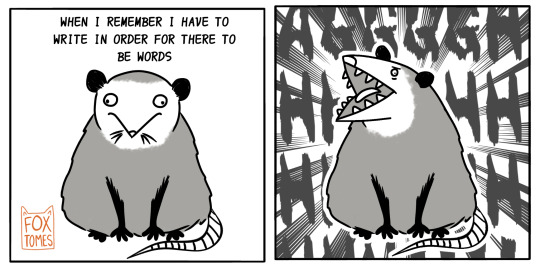
*frustrated possum noises*
4K notes
·
View notes
Text
There's no such thing as "too ridiculous" a story. Ridiculous fails when you don't figure out how to make it work--when you cling too hard to real world rules to make the ridiculousness truly stand up or when you only half build it out.
You as the author have the opportunity to write it so of course whatever you've implemented is how the story works. Of course everyone lives in spherical city pods in the upper atmosphere; how else would they get enough solar power to keep the pods in the air and above the mother dragons that are protecting their nests? ...or whatever you want to write.
Absurdity can be good world building if you lean into it. Don't be afraid of it.
806 notes
·
View notes
Photo




Remains by Hayapi
12K notes
·
View notes
Text
Words to describe facial expressions
Absent: preoccupied
Agonized: as if in pain or tormented
Alluring: attractive, in the sense of arousing desire
Appealing: attractive, in the sense of encouraging goodwill and/or interest
Beatific: blissful
Black: angry or sad, or hostile
Bleak: hopeless
Blinking: surprise, or lack of concern
Blithe: carefree, lighthearted, or heedlessly indifferent
Brooding: anxious and gloomy
Bug eyed: frightened or surprised
Chagrined: humiliated or disappointed
Cheeky: cocky, insolent
Cheerless: sad
Choleric: hot-tempered, irate
Darkly: with depressed or malevolent feelings
Deadpan: expressionless, to conceal emotion or heighten humor
Despondent: depressed or discouraged
Doleful: sad or afflicted
Dour: stern or obstinate
Dreamy: distracted by daydreaming or fantasizing
Ecstatic: delighted or entranced
Faint: cowardly, weak, or barely perceptible
Fixed: concentrated or immobile
Gazing: staring intently
Glancing: staring briefly as if curious but evasive
Glazed: expressionless due to fatigue or confusion
Grim: fatalistic or pessimistic
Grave: serious, expressing emotion due to loss or sadness
Haunted: frightened, worried, or guilty
Hopeless: depressed by a lack of encouragement or optimism
Hostile: aggressively angry, intimidating, or resistant
Hunted: tense as if worried about pursuit
Jeering: insulting or mocking
Languid: lazy or weak
Leering: sexually suggestive
Mild: easygoing
Mischievous: annoyingly or maliciously playful
Pained: affected with discomfort or pain
Peering: with curiosity or suspicion
Peeved: annoyed
Pleading: seeking apology or assistance
Quizzical: questioning or confused
Radiant: bright, happy
Sanguine: bloodthirsty, confident
Sardonic: mocking
Sour: unpleasant
Sullen: resentful
Vacant: blank or stupid looking
Wan: pale, sickly
Wary: cautious or cunning
Wide eyed: frightened or surprised
Withering: devastating
Wrathful: indignant or vengeful
Wry: twisted or crooked to express cleverness or a dark or ironic feeling
104K notes
·
View notes
Text
oh i never know how to explain this properly but i looooooooooooooooove when a story just absolutely TELLS you something and it’s so obvious it goes right by you. like the equivalent of hiding in plain sight. i’m thinking in the original cut(?) of alien where they showed the full xenomorph, crouched and ready to pounce, but because we’ve never seen it before, we can’t tell what it is and interpret it as part of the spaceship. or it’s a detail that seems so out of place or wildly insane that you automatically ignore it and assume you misinterpreted until that exact detail comes back in a big way? (like when noah the raven boy flat out tells everyone he’s a ghost and they take it as a joke, so the reader does too) is there a tvtropes name for this i’m obsessed with it
37K notes
·
View notes
Photo
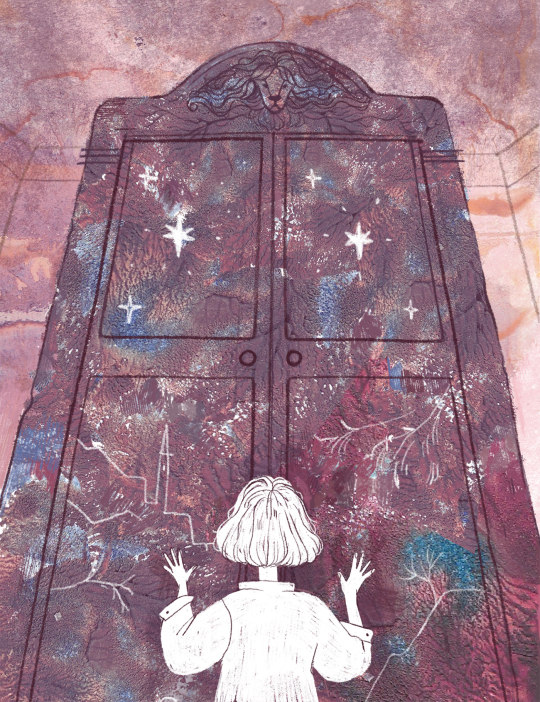
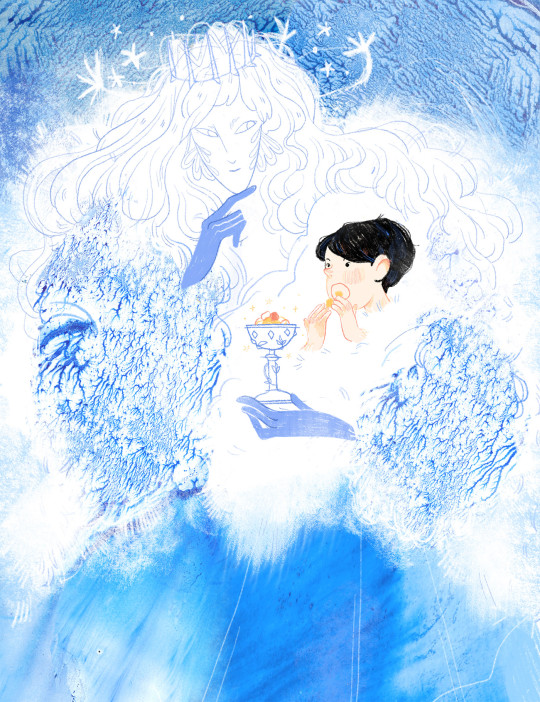
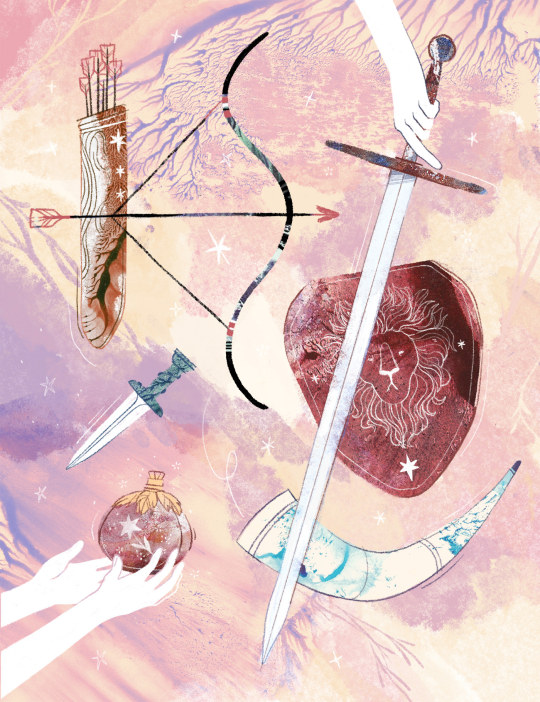
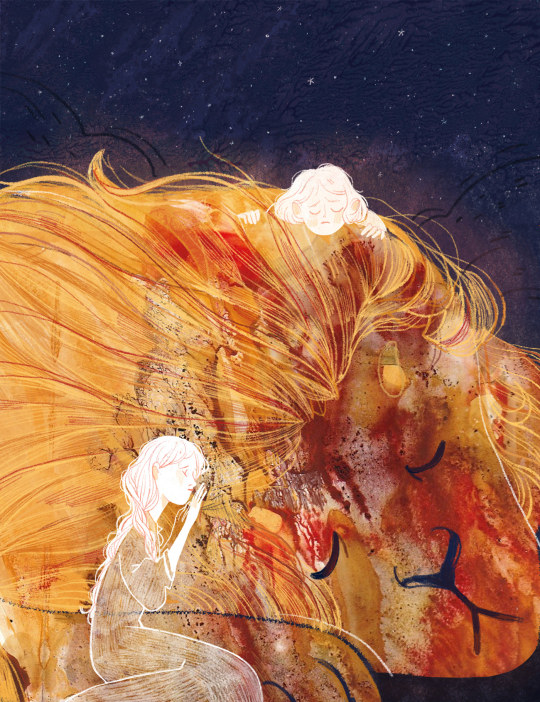
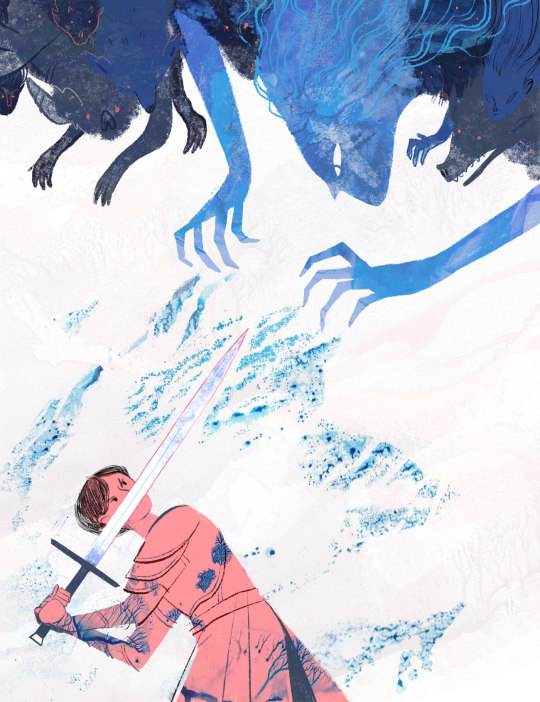
Illustrations for The Lion, The Witch, and the Wardrobe, art by Anastasia Ryzhkova.
7K notes
·
View notes
Text
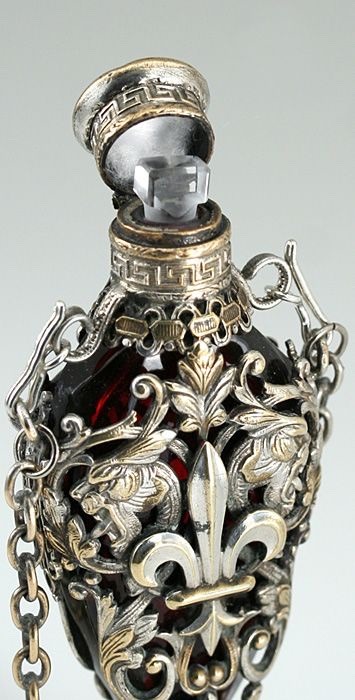

French Caged Ruby Crystal Chatelaine Scent Perfume Bottle (1890)
44K notes
·
View notes